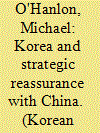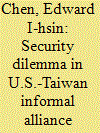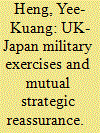|
|
|
Sort Order |
|
|
|
Items / Page
|
|
|
|
|
|
|
| Srl | Item |
| 1 |
ID:
134075


|
|
|
|
|
| Publication |
2014.
|
| Summary/Abstract |
Korea offers not only dangers and risks, but opportunities that could be useful in contributing to a mutual concept of strategic reassurance that Beijing and Washington, along with key U.S. allies like the Republic of Korea, should attempt to introduce into their relationship in a systematic way in the years ahead. The United States has now "rebalanced" toward the Asia-Pacific. But it needs a central organizing concept for what, together with allies, it will do in the region now that it is "back." Coordinating with China about how to handle, cooperatively, any possible major military scenario on the Korean Peninsula as well as the aftermath of any such scenario is a good place to start.
|
|
|
|
|
|
|
|
|
|
|
|
|
|
|
|
| 2 |
ID:
114078


|
|
|
|
|
| Publication |
2012.
|
| Summary/Abstract |
This article has two main goals, one is to explore whether the improvement in cross-Strait relations has increased both the risk of entrapment for Washington and the fear of abandonment for Taipei since 2008, and the other is to examine why the United States provides Taiwan with strategic reassurance. The two main international relations (IR) theories applied in this article are Charles Lipson's theory of informal alliance and Glenn H. Snyder's theory of security dilemma in alliance politics. Taipei may be hoping that when cross-Strait negotiations move from economic and cultural issues to politically sensitive ones, Washington will play the role of guarantor or supervisor. However, the United States may believe that playing such a role would increase its risk of entrapment. On the other hand, fear of abandonment for Taiwan is more likely to arise when the cross-Strait relationship further deepens and expands. While most observers believe that Taiwan's fear of abandonment is greater than Washington's risk of entrapment, some are of the opinion that the rise of China will eventually allow Beijing to intimidate Taipei, leading to Taipei's submission, if cross-Strait relations get out of control. Fortunately, bearing China's expansionist behavior in 2010 in mind, the United States is taking steps to focus its attention on Asia once again, and also emphasizing that Taiwan is an important security and economic partner, thereby easing Taipei's fear of abandonment. Thus, the main conclusion of this article is that while a relatively swift improvement in cross-Strait relations may increase the risk of entrapment forWashington and the fear of abandonment for Taipei, it seems that both the United States and Taiwan have reached a consensus that their current informal alliance should be nurtured by means of strategic reassurance, given China's potentially expansionist behavior.
|
|
|
|
|
|
|
|
|
|
|
|
|
|
|
|
| 3 |
ID:
161512


|
|
|
|
|
| Summary/Abstract |
The Asian Infrastructure Investment Bank (AIIB) has been widely conceived as a Chinese effort to promote reforms of global financial governance. While the existing literature of contested multilateralism tends to focus on the problem of threat credibility, this article highlights the necessity of strategic reassurance in institutional contests. To facilitate incremental reforms of the existing order, rising powers like China need not only to pose credible challenge towards established institutions, but also to demonstrate their benign intentions and commitment to future cooperation. Besides revealing strength and resolve, the creation of a new multilateral regime helps rising powers to signal their self-restraints and reassure other powers. Consequently, the institutional configuration of new multilateral organizations involves a trade-off between the dual needs for threats and reassurance. Chinese behaviours in creating the AIIB can be explained through this framework.
|
|
|
|
|
|
|
|
|
|
|
|
|
|
|
|
| 4 |
ID:
179965


|
|
|
|
|
| Summary/Abstract |
The United Kingdom (UK) and Japan have conducted unprecedented military exercises as each other’s closest security partners in Asia and Europe, respectively. Despite publicly avowed closeness, these military exercises were not predicated on formal alliance commitments or deterrence of common adversaries underpinned by shared threat perceptions. Addressing this puzzle, a hitherto-overlooked perspective of mutual strategic reassurance for trusted partners is proposed here. This paper derives hypotheses from existing – but relatively under-developed – literatures on military exercises and reassurances that locate the drivers of reassurance in the needs and weaknesses of the other. What stems from this starting premise is an importance placed on high-level diplomacy and adjusting military deployments to allay each other’s strategic concerns. These hypotheses are tested by presenting original interview data supplemented with discourse analysis of both primary and secondary sources. The findings suggest that effusive diplomatic language vowing politico-strategic support for each other, reinforced by ground-breaking military exercises mutually reassured UK concerns about retaining post-Brexit global standing and Japan’s apprehension over its dire geo-strategic context. While not quite deterrence or alliance, these military exercises enabled the UK and Japan to transform their predominantly trade-based relationship into a more defence-oriented one.
|
|
|
|
|
|
|
|
|
|
|
|
|
|
|
|
|
|
|
|
|